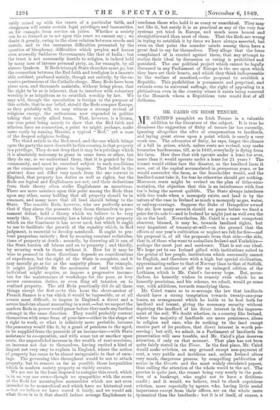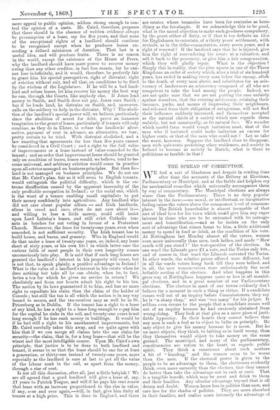MR. CAIRD ON IRISH TENURE.
TR. CATRD'S pamphlet on Irish Tenure is a valuable- 1/1 addition to the literature of the subject. It is true he- dismisses the suggestion of fixity of tenure far too cursorily, ignoring altogether the offer of compensation to landlords, and laying great stress upon a point which is surely a very weak one. The advocates of fixity, he says, forget the chance- of a fall in prices, which, unless rents are revised, may make tenancies burdensome, till, as in 1849, everybody is flying from his farm. How does that risk operate under a lease for ever, more than it would operate under a lease for 21 years ? The- tenant would either face the disaster, as the landlord faces it now, out of the capital accumulated in prosperous years, or he- would surrender the farm, as the leaseholder would, and the landlord must take it, for fear he otherwise should get nothing. Moreover, rents might be revised on the plan of tithe-com- mutation, the objection that this is an interference with free- tra le being the merest quibble. The State always interferes- with free trade when a monopoly exists, and land is by the- nature of the case in Ireland as much a monopoly as gas, water, or railway-carriage. Suppose the Duke of Hampshire owned the air, how many seconds should we pause before we fixed a price for its sale ?—and in Ireland he might just as well own the- air as the land. Nevertheless, Mr. Caird is a most competent observer, biassed, it may be, towards landlord rights, but very impatient of tenancy-at-will—on the ground that the- effects of one year's cultivation or neglect are felt for five—and his proposal is, of all the proposals from that side—the side, that is, of those who want to assimilate Ireland and Yorkshire— perhaps the most just and moderate. That is not our ideal. We hope yet to see Ireland gifted with institutions suited to the genius of her people, institutions which necessarily cannot be English, and therefore with a high but special civilization, approximating rather to that of Norway than to that of Suffolk, and are not anxious at all for an enlarged edition of the Lothians, which is Mr. Caird's far-away hope. But, never- theless, he honestly wishes to remedy evils which he as honestly proclaims, and his scheme, we admit, would go some way, with additions, towards remedying them.
Mr. Caird wants so to re-arrange the law that landlords. should have a strong temptation towards twenty-one-year leases, an arrangement which he holds to be best both for landlord and tenant, giving the necessary security without depriving the landlord of his direct interest in the improve- ment of the soil. We doubt whether, in a country like Ireland, where the majority of landlords are mere pensioners, aliens in religion and race, who do nothing to the land except receive part of its produce, that direct interest is worth pre- serving ; but still, we admit, in a Parliament of landlords its. preservation will save trouble, and Mr. Caird's plan deserves. attention, if only on that account. That plan has not been quite fairly stated in the Times. In the first place, Mr. Caird would make eviction, on any ground except non-payment of rent, a very public and invidious and, unless Ireland alters very much, dangerous process, by compelling publication of- notice in the Gazette and the most widely circulated papers, thus calling the attention of the whole world to the act. The proviso is quite just, the tenant being very nearly in the posi- tion of a bankrupt, who ought not to have a fictitious credit ; and it would, we believe, tend to check capricious eviction, more especially by agents, who, having little social importance except from their offices, are on the whole more- tyrannical than the landlords ; but it is of itself, of course, a
mere appeal to public opinion, seldom strong enough to con- trol the opinion of a caste. Mr. Caird, therefore, proposes that there should in the absence of written evidence always be presumption of a lease, say for five years, and that none of the exceptional rights of a landlord should continue to be recognized except when he produces leases ex- ceeding a defined minimum of duration. That last is a useful idea, and will produce fruits. There is no reason in the world, except the existence of the House of Peers, why the landlord should have more power to recover money owing than any other creditor, in fact less reason, for he can- not lose indefinitely, and it would, therefore, be perfectly fair to grant him his special prerogatives, right of distraint, right of eviction without suit, tind all that, on conditions to be fixed by the wisdom of the Legislature. If he will be a bad land- lord and refuse leases, let him recover his money the best way he can, through the Courts, like anybody else. If Jones lend money to Smith, and Smith does not pay, Jones sues Smith ; but if he lends land, he distrains on Smith, and, moreover, calls on the soldiery to help in the distraint. Why ? The aboli- tion of the landlord's special power will, we believe, particularly since the abolition of arrest for debt, prove an immense temptation to the grant of leases, particularly if tenants will only combine, as they do in Ulster, to refuse the landlords' alter- native, payment of rent in advance, an alternative, we fear, pretty certain to be tried. With distraint abolished, and a law enacting that agreements for less than five years cannot be considered in a Civil Court ; and a right to the full value of improvements or a lease instead of value- conceded to the tenant ; and an order that improvement loans should be granted )nly on condition of leases, leases would, we believe, tend to be- come universal, and arbitrary eviction would cease in practice upon all estates managed on business principles. But then Ire- land is not managed on business principles. We do not see that Mr. Caird's plan, fair as it will seem to English tenants, would extinguish the politital difficulty, which is the ex- treme disaffection caused by the apparent insecurity of the only profitable occupation in Ireland ; or the social one, which is the want of a tenure enabling small capitalists to put their money confidently into agriculture. Any landlord who did not care about popular odium — and Irish landlords, aliens in creed and race, often do not care about it— and willing to lose a little money, could still insist upon Lord Leitrim's leases, and still evict Catholic ten- ants in batches for not voting in favour of a Protestant Church. Moreover, the lease for twenty-one years, even when conceded, is not sufficient security. The Irish tenant has to build house, and barns, and granary. Who in England would do that under a lease of twenty-one years, or, indeed, any lease short of sixty years, or his own life ? in which latter case the curious faith of most people in their own longevity comes unconsciously into play. It is said that if such long leases are granted the landlord's interest in his property will cease, but is not that, to speak plainly, a positive advantage in Ireland ? What is the value of a landlord's interest in his estate when he does nothing but take all he can obtain, when he, in fact, levies a tax for which he gives no service in return ? We absolutely and from our hearts admit his right to his tax. The nation by its laws guaranteed it to him, and has no more right to repudiate his claim than the claim of the holder of Consols ; but still the tax is all which the nation is in any way bound to secure, and the tax-receiver may as well be in St. Petersburg as in Dublin. If the tenant has a right to a lease of any kind, he has a right to a lease long enough to repay him for the capital he sinks in the soil, and twenty-one years is not long enough if he has sunk money in buildings. It would be if he had still a right to his unexhausted improvements, but Mr. Caird carefully takes this away, and we quite agree with him that if we can merge all claims into the one claim for security—the claim, that is, for a long lease—that will be the wisest and the most intelligible course. Upon Mr. Caird's own principle, that justice is to be done to both landlord and tenant, it seems to us that the lease should be one for at least a generation, or thirty-one instead of twenty-one years, more especially as the landlord is sure at last to get all the value of the labour sunk in the soil, as apart from the money, through a rise of rent.
Is not all this discussion, after all, just a little babyish ? We are all agreed that a good landlord will give a lease of, say, ! 21 years to Patrick Teague, and will if he pays his rent renew that lease with an increase propertioned to the rise in value, if any, over and over again,—will, in fact, give him fixity of ! tenure at a high price. This is done in England, and there are estates where tenancies have been for centuries as here- ditary as the fee-simple. If we acknowledge this to be good, what is the moral objection to make such goodness compulsory, by the grant either of fixity, or if that is too definite an idea for Englishmen to entertain, of a thirty years' settlement, with revisals, as in the tithe-commutation, every seven years, and a right of renewal? If the landlord says that he is injured, give him the right of surrendering his estate at a valuation, and sell it back to the peasantry, or give him a fair compensation, which they will gladly repay. What is the objection ? Simply this in reality, that the plan upsets in one of the Three Kingdoms an order of society which, after a trial of six hundred years, has ended in making every man below the enemy, often to the death, of every man above, and substitutes for an aris- tocracy of landowners an aristocracy composed of all who are competent to take the lead among the people. Indeed, we are not quite sure that we are not putting the case unfairly against ourselves, that the existing aristocracy, retaining their incomes, parks, and means of impressing their neighbours, and released from their obligation of antagonism, will not find their influence suddenly increased, and themselves accepted as the natural chiefs of a society which now regards them unfairly, but not unnaturally, as its natural foes. We wonder which model farm would tempt imitation most, that of the man who if imitated could make imitation an excuse for higher rents, or that of the man who could not ? Let us take the worst, however. Suppose the landlord class to disappear, men with quit-rents preferring other residences, and society in Ireland to become as society in Zurich, what is there to politicians so terrible in that ?































 Previous page
Previous page